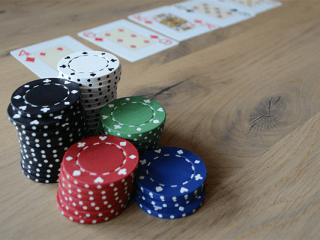Pocket Pairs Poker
By Alex Smith, Last updated Mar 23, 2024

When you’re playing Texas Hold’em poker, you will come across a wide variety of different hands. While, at showdown, pocket pairs rarely have much value against a full table, when you’re playing pre-flop, they have a LOT of value – and even the lowest pocket pair, a pair of twos, has a 50% chance of winning against an Ace-King hand!
However, when you’re dealt pocket pairs it’s really important that you know how to play them correctly. For example, the way that you play small pocket pairs is a lot different to the way that you play big pocket pairs.
On this page, we will look at the different pocket pairs in poker hands. We’ll show you how to play the different pocket pairs – and when you should consider throwing them away, even if, at first, they look very tempting.
Pocket Pair Types
There are three different types of pocket pair combinations you can be dealt. This includes small pocket pairs (a pair of sixes or below), a medium pocket paid – sevens, eights, nines, and tens – and high/premium pocket pairs – jacks, queens, kings, and aces.
While some players may have a slightly different view on these rankings (some poker players would consider pocket tens to be a premium starting hand, for example), this is the most commonly accepted definition.

$ 35 for USD /CAD
No Maximum
40 x
No code required
–
–
Yes
Get $9,750 in free bets with Casino Max’s amazing welcome offer. 325% match for your 1st, 2nd and 3rd deposits.
Crypto Deposit: $10+ for a 350% bonus
All Deposits: $35+ for a 325% bonus
Wagering: 40x
– Total Maximum Bet is $10
– Bonuses will automatically be removed at the point of requesting a withdrawal

$10; $20 if depositing via BTC
N/A
20x (deposit+bonus)
–
–
$110
Yes
The Odds of Being Dealt Pocket Pairs
Before we look at how to play your pocket pairs, it’s important for you to have an understanding of the odds – and your chances of being dealt various pairs. The odds of you being dealt a pair of pocket aces (the best starting hand in poker) is 0.45%; this means you will be dealt them once in every 220 hands. The odds of being dealt a premium pair – jacks or better – is 1.8%. This means you will be dealt a premium pair once in 54 hands.
The odds of being dealt a pair of eights or better is 3.2%. This equates to a 31/1 chance. The odds of being dealt any pocket pair is 5.9%, which equates to a 17/1 shot. Of course, the actual odds can vary a lot; some players will be dealt pocket aces back to back, while others won’t see them for hundreds – or even thousands – of hands!
How to Play Pocket Pairs
Now that you know what a pocket pair is, and the odds of you being dealt one at the poker table, it’s time to take a look at how to play the different pairs. Please note, we’re going to be focusing mainly on cash games; if you play tournaments, the playing style for a pocket pair can be very different. This is especially true when you’re in the latter stages of a tournament or have a short chip-stack.
Small Pocket Pairs
If you want to know how to play small pocket pairs, this section is designed for you! Small pocket pairs are actually some of the hardest starting hands to play, and many players end up getting themselves into trouble as a result of playing them. Small pocket pairs seem to have so much potential – but, if you’re not careful, you can get into quite a lot of trouble with them. Of course, if you manage to hit the right flop, small pocket pairs can be incredibly valuable – but you need to know when to fold’em, as they say.
The general way of playing small pocket pairs – 22-77 – is actually quite simple. The goal is to see the flop as cheaply as possible, and hope that you hit a set – a 3-of-a-kind. You then want to trick your opponent into thinking you have an overpair when they have a hand like top-pair with a strong kicker. In theory, this all sounds well and dandy – but in reality, you’re going to have to deal with a ton of different traps and circumstances along the way.
If you have a small pocket pair, the odds of you hitting a set on the flop are about 12% – or, one in 7.5. On the face of it, this actually sounds like a pretty decent number. However, you need to remember that 88% of the time you won’t hit a set on the flop. What’s more, even when you do manage to hit a set, there are no guarantees that you have the winning hand – and there’s also no guarantees that you will be able to stack your opponent like you’re thinking.
Because of this, you need to be really careful when you play small pocket pairs. Firstly, you should try to see the flop as cheaply as possible. It’s usually OK to call a raise pre-flop, but you don’t want to get involved with a raise, re-raise type of situation. In these situations it’s almost always better just to throw away your hand.
When you are playing pocket pairs that are small, it’s also inadvisable to turn your hand into a bluff. You should also avoid – for the most part – three-betting. Poker science has shown, time and time again, that this simply isn’t a winning or profitable play in the long-run. Finally, you should remember that if you do miss the flop, bluffing your way down to the river to try and take down the pot isn’t usually a good idea.
While it can seem really tempting to try and see the flop when you’re holding a weak pair like 22 or 33, remember, if you don’t manage to hit your set on the flop you will almost always hold a very poor and weak hand. The last thing that you want to be doing is investing a significant portion of your stack before the flop is dealt.
Secondly, you should bear in mind that if you aren’t in charge of closing the action, and the original raiser 4-bets or 5-bets, you will almost always have to fold your chance or make a very incorrect call; there’s almost no circumstances where you have the correct odds to play here.
Thirdly, you should remember that 88% of the time you are going to completely miss. Sure, you might pick up some backdoors – but with such a lower pair, you’re never going to have a huge edge here in the long-run. Of course, this isn’t to say that you can’t ever bluff with these low pairs – but generally, you should avoid doing so as, in the long-run, it’s not a plus-ev play.
Medium Pocket Pairs
Medium pocket pairs can be incredibly hard to play; there is very rarely a “one-size-fits-all” strategy for these pairs, and, unlike small pocket pairs, they’re not as easy to simply throw away pre-flop. The best general advice for playing medium pocket pairs is to try and get heads-up before going to the flop. Like with small pairs, you should try to reach the flop as cheaply as possible; however, if you hold 88, 99, or 1010, some players would say a pre-flop raise is more than justified.
The reason why you want to try and get heads-up is because when you’re playing against a single opponent, you stand a pretty good chance of winning with one of these hands; you don’t necessarily need to even hit a set on the flop to win. If you play a medium pair against multiple players and end up hitting a set, however, you can end up winning a lot of money if the other players involved with the hand hold a decent hold.
According to most poker strategy books, there are also situations where it’s OK – and even advisable – to play medium pairs as premiums. In fact, even a small pocket pair can be played as a premium given the right circumstances. For example, imagine that you’re playing in a poker tournament and are down to just 30 big blinds.
If you’re holding 88, and the under-the-gun player puts in a raise, you can fold, call, or raise; folding is out of the question, as is calling – so your best bet, mathematically, is to shove all in. Even if they call, there’s only a handful of hands you’re immediately at a disadvantage to – and two overcards only puts you at around 50/50 with them.
Of course, there are other scenarios where you would fold 88 pre-flop. If you are facing a raise and a three-bet, you will almost always want to fold your hand away, unless you decide to put in a raise and try to bluff the other opponents off the hand.
High (Valuable) Pocket Pairs
High pocket pairs – also known as premium pocket pairs – are one of the best pre-flop hands you can have in Texas hold ‘em poker. Depending on who you speak to, some people would classify pocket jacks as being a somewhat marginal hand, but a pair of queens or better is almost always an incredibly solid hand. We should also point out that the value of premium pocket pairs increases significantly as the number of players involved with the pot decreases; this is because you are much less likely to get out-flopped by a single opponent as opposed to a full table.
This is one of the reasons why you should try to get as much money as you can into the pot before the flop is dealt. This is true for the majority of tournament situations – with perhaps the only exception being the earliest stages of the tournament – and all cash games where you are not sat on an overly deep stack of chips. Please note that as the stacks of chips get deeper, you may need to adjust your strategy slightly, especially with the lower premium pairs like jacks or queens.
Naturally, you will not be able to always get money into the pot before the flop, and you will often find that you put in a raise and your opponents simply call your bet. When this happens, there’s a couple of things you should keep in mind.
Firstly, if there are no over cards on the flop, you are very likely going to have the best hand. However, if you are playing against multiple opponents, you need to be careful not to get too attached to your hand. This is because one of your opponents may have called arrays with a small pocket pair and may have hit a set on the flop.
For example, if a board comes down of 9, 5, 2, and you have a pair of Kings, you will almost always have the winning hand here; even when you are playing against multiple opponents your hand will normally be the winner. Because of this, you should generally avoid being afraid of sets.
That being said, if there is a significant amount of action in the flop, and your opponents are putting in three and four-bets, you need to be careful not to get too married to your hand. Don’t forget that your opponents could also hold a hand like a two-pair or even a larger pocket pair than you.
What to Keep in Mind When Playing a Pocket Pair in Poker
While the three categories we have looked at above should cover the majority of situations you will encounter at the poker table, there are also some common considerations that you can take into account. These pretty much apply to all hands you play the poker table, but they are especially relevant when you are playing perfect pairs. This is down to the fact that perfect pairs do not occur as frequently as other hand.
Your Stack Size
Your stack size – or, in other words, your effective stack size – is one of the biggest considerations you should take into account when choosing how to play a pair. For example, if you hold a small pocket pair, you generally don’t want to get into too much action against an opponent who is starting a hand with just 25 big blinds, for example. Doing so simply is not profitable for you, and there is not enough potential reward to justify the risk.
However, if you are playing in a cash game and you and your opponent are both very deep, then it can often be worth calling a big raise pre-flop with a small pocket pair in the hopes of hitting a set. If you manage to do so, and your opponent holds a big over pair, you could manage to stack them.
Things become more tricky when you are playing with medium and low-high pocket pairs. While you almost always have an easy decision against a short stack, pushing your chips right into the middle of the pot, against big stacks it can be quite scary to play these hands too aggressively, so always try to keep stack sizes at the back of your mind when playing pairs.
Your Position
If you hold a premium pocket pair, your position at the poker table is not really relevant. However, when you hold a weaker pair, your position is a lot more important. For example, you will find that it is much easier to extract value from your hand when you are the last to act; this gives you a much better understanding of the potential strength of your opponents hands, and it means that you can see what your opponents are doing before the action gets round to you.
If you are out of position, it’s generally not advisable to go chasing sets. This is because you will often end up missing value by checking on the turn, and this allows your opponent to then check behind. Doing so is a negative-EV play in the long run and even the short run can get you into quite a lot of trouble.
Your Players’ Traits
Another really important thing to keep in mind when you are playing poker is your opponent’s tendencies. The more you play against a table of opponents, the more you will begin to learn to recognise how they play – and this includes how they play their pocket pairs. Knowing how they do so can then impact how you play your pocket pairs. For example, if you are playing against loose players, where they tend to stack off lightly, trying to see the flop to make a set with a low pocket pair can become an incredibly profitable move.
This is because your implied odds increase significantly, and you stand to win a lot of money if you are lucky enough to stack your opponent. On the other side of the coin, if you are playing in a pretty tight game, the value of a set decreases quite a lot. What’s more, even if you are lucky enough to hit a set, you won’t be able to stack your opponent anywhere near as easily.
While you do not have to take out charts and write dedicated notes on your opponents, it can be helpful to make a few mental notes of their playing styles so you can adapt your game accordingly.

$ 35 for USD /CAD
No Maximum
40 x
No code required
–
–
Yes
Get $9,750 in free bets with Casino Max’s amazing welcome offer. 325% match for your 1st, 2nd and 3rd deposits.
Crypto Deposit: $10+ for a 350% bonus
All Deposits: $35+ for a 325% bonus
Wagering: 40x
– Total Maximum Bet is $10
– Bonuses will automatically be removed at the point of requesting a withdrawal

$10; $20 if depositing via BTC
N/A
20x (deposit+bonus)
–
–
$110
Yes
Conclusion
Whether you hold pocket queens or even higher pocket pairs, players all have slightly different opinions on the best way of doing things when it comes to small pairs, medium pairs, and big pairs. For example, some poker players will simply avoid small pairs unless they’re near the big blind – others will play every pair they get in the hopes of hitting a 3-of-a-kind and potentially stacking their opponents.
Keep in mind that the type of game you are playing can have quite a big impact on how you should play your hands. For example, short-stuck tournament play is very different to Deep-stacked cash gameplay, and you should be aware of the subtle differences before sitting down at a table so you know how to play your hand most effectively.
Don’t be afraid to fold pairs – even premium pairs – if you are relatively certain your opponent has you beat. Don’t invest too much money in trying to see the flop because while it can be tempting to try to hit a set, 88% of the time you will fail to do so. Furthermore, even if you do hit a set, there is a chance that your opponent will have you beat.
Latest Poker Related Articles
How Does a Casino Make Money on Poker?
It will come as no surprise to learn that online poker sites and online casinos are in the business of making money; that’s their ultimate goal, and while many of these sites may offer attractive – and lucrative – bonuses and promotions designed to temp in new players, the ultimate goal is to generate as much revenue as possible.
How to Play Slow Roll Poker
The goal of poker is to beat your opponent; in fact, doing so is actively encouraged! However, while you should always try your best to throw your opponents off-balance and coerce them to make mistakes
What is the Dead Man’s Hand in Poker?
The deadman’s hand is one of the most iconic hands in poker. While some players have slightly different definitions of the dead man’s hand, most people regard it as a hand containing two Aces and two Eights – equalling two pairs. However, while the hand may look quite simple, there is much more to meet the eye.
What Happened to Mike Matusow
If you’re wondering what’s actually happened to Mike Matusow – and want to know what this colorful character is up to these days – keep reading to find out what this star poker player is up to these days!
How to Play Red Dog
Red Dog, also known as Red Dog Poker, is quite a popular game. Today, you will find it offered at most online casinos. Some land-based casinos also offer it, although it’s not found as commonly.




 Top 5 casinos
Top 5 casinos 

